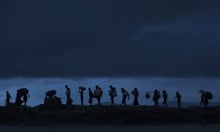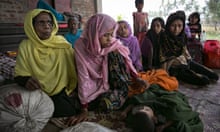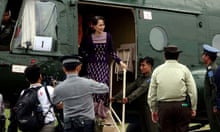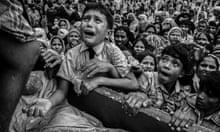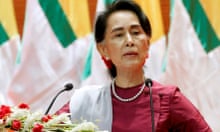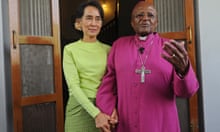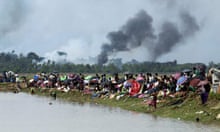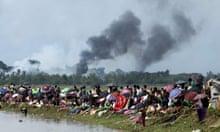The treatment of Myanmar’s Rohingya Muslims by the country’s military, including allegations of rape and helicopter gunships firing randomly on villages, may constitute crimes against humanity, Amnesty International has said.
South-east Asian foreign ministers met in Yangon on Monday for emergency talks about the two-month campaign against a nascent insurgency, during which time Myanmar’s leader, Aung San Suu Kyi, has failed to respond to international criticism.
More than 27,000 people from the ethnic group have fled to Bangladesh, leading to an open spat within the Association of Southeast Asian Nations (Asean), a regional 10-member bloc.
Who are the Rohingya?
The Myanmar government does not recognise the roughly 1.1 million Muslim Rohingya as citizens, creating a stateless people.
In 2012, deadly clashes with Buddhists in the western state of Rakhine caused 140,000 Rohingya to flee their homes. Many have since paid people smugglers to take them on dangerous sea voyages to Thailand, Malaysia and Indonesia where they are often exploited.
Extremist nationalist movements insist the group are illegal immigrants from Bangladesh, although the Rohingya say they are native to Rakhine state.
Rights groups accuse Myanmar authorities of ethnic cleansing, systematically forcing Rohingya from the country through violence and persecution, a charge the government has denied.
Malaysia, where most of the population is Muslim, has called for an independent investigation into the allegations and for complete humanitarian access to the locked-down area in Rakhine state, where more than 130,000 people are without aid.
Malaysia’s foreign minister, Anifah Aman, warned that the crackdown could trigger a repeat of last year’s boat crisis, when thousands of starving Rohingya were abandoned at sea.
“We believe that the situation is now of a regional concern and should be resolved together,” he told the meeting, according to a statement released by Kuala Lumpur.
“Myanmar must do more in trying to address the root causes of this problem,” he added.
This month, Malaysia’s prime minister, Najib Razak, said “the world cannot sit by and watch genocide taking place”, opening a rift within Asean, which normally maintains a diplomatic tone among members.
Myanmar, which denies allegations of abuse, summoned Malaysia’s ambassador and banned its workers from going to the country.
The Myanmar army says it is hunting militants behind deadly raids on police posts in October. Rohingya survivors have made allegations of rape, murder and arson by security forces.
“The Myanmar military has targeted Rohingya civilians in a callous and systematic campaign of violence,” said Rafendi Djamin, Amnesty’s south-east Asia director. “The deplorable actions of the military could be part of a widespread and systematic attack on a civilian population and may amount to crimes against humanity.”
The Rohingya are a minority of about a million people who, despite living in the country for generations, are treated as illegal immigrants and denied citizenship. They have been persecuted for years by the government and nationalist Buddhists.
The recent bloodshed is the most deadly since hundreds were killed in clashes in 2012 and more than 100,000 were forced into squalid camps. Aung San Suu Kyi, the Nobel peace prizewinner and de facto leader of Myanmar, has been criticised for not doing more to stop military action in the area.
Amnesty’s report was based on extensive interviews with Rohingyas in both Myanmar and Bangladesh, as well as analysis of satellite imagery, photos and videos.
It accused the military of torching more than 1,200 Rohingya homes, and said government forces sometimes burned down whole villages. Several eyewitnesses also described how soldiers used rocket-propelled grenade launchers to destroy houses, Amnesty said.
Images released by Human Rights Watch in November showed 1,500 burned homes.
The Amnesty report said that in one incident on 12 November, after a skirmish with suspected militants two helicopters fired randomly on fleeing villagers fleeing, killing an unknown number. The next day troops set fire to hundreds of homes.
Amnesty’s report follows criticism from the UN’s high commissioner for human rights, Zeid Ra’ad al-Hussein, who said the government’s handling of the crisis was “short-sighted, counterproductive, even callous”.
“The results have been catastrophic, with mass displacement, the nurturing of violent extremism, and everybody ultimately losing,” al-Hussein said in Geneva on Friday.
AP and AFP contributed to this report

